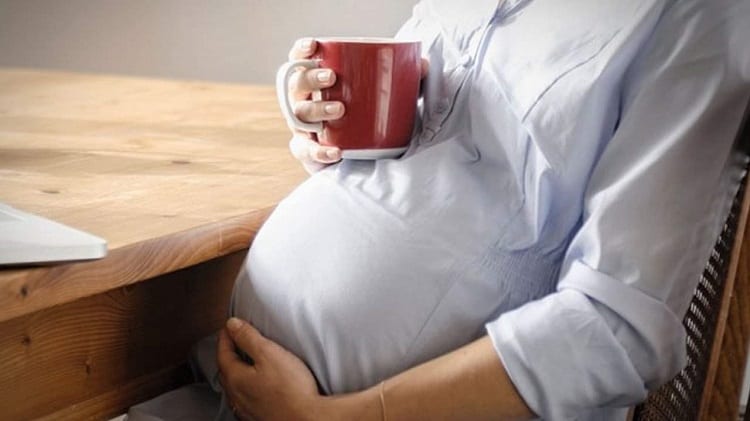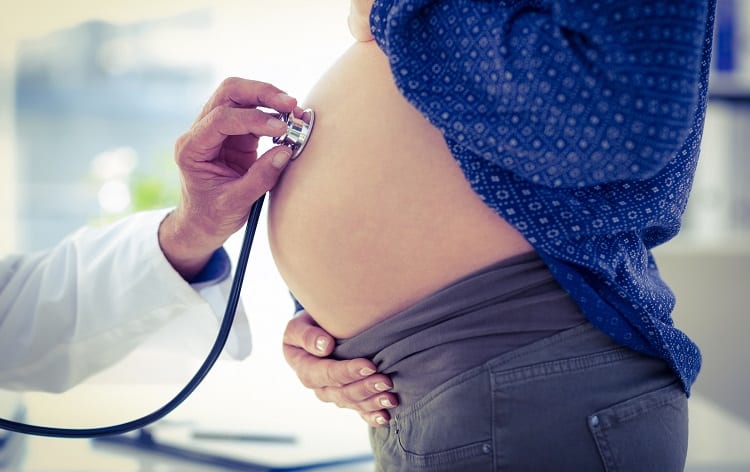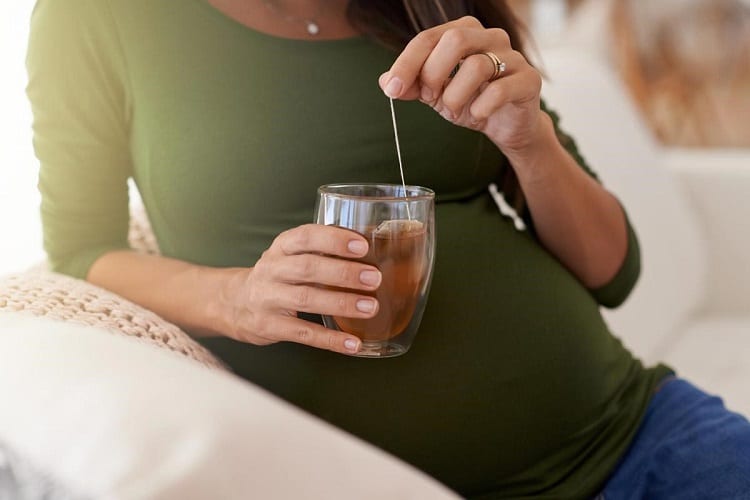Coffee during pregnancy is completely okay unless otherwise advised by your doctor.
Those facing high-risk pregnancies will almost certainly be told to avoid coffee and caffeine in general, as well as a laundry list of other things.
Caffeine is what we should really be talking about. Coffee contains loads of natural caffeine, meaning it’s not synthetically designed.
In fact, much like tea, coffee is something that actually tends to taste and behave worse the more you process it.
So synthetic caffeine that you find in energy drinks like Red Bull would be far worse for you than coffee, so let’s just get that out of the way now.
Caffeine found in coffee and tea doesn’t get your heart racing the same way.
Yes, it’s still caffeine, and yes, it’s still a stimulant. However, having coffee during pregnancy—first, second, or third trimester—is perfectly okay in moderation.
Your body will, on average, produce an additional 50% of your blood volume to account for the blood flow to your womb, being primarily the child’s blood.
How Much Coffee is Safe During Pregnancy?

If you purchase a 10 oz cup of Arabica coffee, you’re consuming about 140 mg worth of caffeine.
That’s hot coffee, by the way—you can’t really gauge a cup of iced coffee due to the ice volume and how much coffee you actually end up getting.
140 mg of caffeine isn’t going to send your child’s heart into a frenzy; it isn’t going to make you lightheaded or ruin your day.
In fact, you could have two cups of coffee spaced about eight hours apart, equaling roughly 280 mg of caffeine in a day.
So why is this? For starters, caffeine is often demonized, especially during pregnancy. Nobody takes the benefits into account. Some benefits of caffeine include:
- Heightened brain function (Study)
- Cancer risk reduction (Study)
- Reduced chance of stroke (Study)
- Reduces inflammation (Study)
- Increased heart function (Study)
It’s important to note that there are numerous studies on caffeine (and specifically coffee), and not all are conclusive.
That being said, there is an overwhelming amount of scientific literature and controlled studies that point to these benefits found in coffee.
While some of these studies talk about an average of four cups, or about 560 mg of caffeine per day, that’s for an average adult male.
Women are better off at an average of three cups per day, or 420 mg of caffeine, but of course, pregnancy affects this.
Two cups of coffee per day—one in the morning, one during midday—could actually help increase cardiovascular function and keep things flowing the way they’re supposed to be.
Caffeine can be harmful during pregnancy, which we’re going to get into now, but it’s not strictly an aggressor.
Effects Of Coffee On Unborn Children

The jury is still out on caffeine.
Its effects are widespread; from your heart to your brain, blood flow to stimulation, and more, caffeine affects nearly everything in your body.
But on an unborn child, it’s even more difficult to tell. There are so many variable factors to consider when it comes to this that you just don’t really know what you’re going to encounter.
Well, the folks at BMJ did an extensive study that lasted for years, which concluded that there is an increased chance that children will become obese eight years after birth.
It should be noted that the information recorded and reported by the parents of these children was not under laboratory conditions.
That same study did find that the first year of a child’s life when having been introduced to caffeine in the womb, grows faster than children who do not have caffeine in utero.
That stops after the first year of life, and as far as we know, it has no negative influence on the rest of the child’s life apart from these two main parameters.
While the child is still in your uterus, drinking coffee while pregnant gives an extremely small increase to your likelihood of miscarriage.
The margin is negligible, but if you want to be extra safe, you can stave off coffee altogether while pregnant.
All effects of coffee on unborn children are subject to your individual case.
Based on two separate studies, you can get extremely conflicting conclusions that point to either definitely having infertility and miscarriages, and another study that shows there is little to no risk of consuming caffeine while pregnant.
According to the American Pregnancy Association, because of the remarkably polarizing conclusions by these two separate and reputable studies, the March of Dimes simply states that women shouldn’t drink more than 200 mg of caffeine per day in an effort to avoid birth defects.
This was the main parameter in one study that stated having above this number would be dangerous.
When Should You Stop Drinking Coffee During Pregnancy?

When you have caffeinated soda during your day, or you drink calming tea at night to put you to sleep, or when you ingest chocolate or other foods that contain caffeine and stimulants.
Caffeine is caffeine.
While it’s more easily processed when it’s natural, such as in coffee or tea, having caffeine in various parts of your daily diet all contribute to your metabolic cycle, and too much is a bad thing.
You should stop drinking caffeine during pregnancy when your doctor tells you to. If at any point you go into a high-risk pregnancy, coffee will likely be the last thing you should have.
Every woman goes through pregnancy differently. If you find your emotions running on high due to hormone surges, you should cut out coffee as well as all other stimulants.
Having an anxiety-based episode could send you into labor, and if coffee is indirectly making you feel more anxious through its stimulation, just cut it out.
Assess how you feel after having one cup to see what your body goes through.
Is Espresso Safe During Pregnancy?
Espresso contains more caffeine than an entire 16-ounce can of Red Bull or a 20-ounce can of Monster.
Since a standard 10-ounce cup of coffee contains roughly 140 mg of caffeine, it’s important to know that a single 2 oz shot of espresso has about 130 mg of caffeine in it. A 5:1 ratio.
The thing with espresso is that it’s quick; you drink a latte quickly or have straight-up espresso without blinking.
With a cup of coffee, you sip, you enjoy it for longer, so the caffeine is steadily imbued into your bloodstream instead of being a shock to the system.
Espresso shouldn’t be consumed while pregnant. If you’ve ever had decaf espresso, then you would probably rather go with a standard cup of coffee instead (I know I would).
Ways To Enjoy Coffee While Pregnant
You can still drink coffee while pregnant.
If you don’t do it for that wake-me-up feeling in the morning and you genuinely just enjoy the flavor and experience, there are other ways for you to enjoy a coffee while pregnant that will not jeopardize your child.
Switch to Decaf

It’s every coffee drinker’s worst nightmare to hear that they should switch to decaf, but it’s your first option if you want to continue to enjoy coffee while pregnant.
If you decide to switch to decaf, you should feel some joy in knowing that it usually only takes about nine times to try something new to develop a taste for it.
It’s how nutritionists help people get off of food that’s bad for them and get hooked on healthy foods.
If you do make the switch, try to exclusively purchase Swiss Water Process decaf, since it uses zero chemicals and has a more natural flavor.
Try Instant
Instant coffee is the thing you keep in the cabinet in case the power goes out for a day, or it’s the coffee you serve to guests when your gourmet blend is running low.
But you know what?
Instant coffee generally has 45% less caffeine than standard coffee that’s been prepared through a drip machine.
This means that if you’re comfortable having 140 mg of caffeine per day, you could have two cups of instant over one cup of regular coffee.
Don’t worry; it doesn’t take long to get used to the flavor.
Opt For Coffee-Flavored

Just love that taste of coffee?
If you want to skip the caffeine, it’s understandable, but you’re going to crave things with passion while you’re pregnant, so why not make it coffee-flavored?
Whether it’s a beverage or a type of dessert, you can find coffee-flavored things to keep the cravings at bay.
Everything In Moderation
Coffee is fine, caffeine is okay; just don’t go overboard.
If you’re used to drinking three to four cups per day, limit yourself to two while pregnant.
Try alternative ways to enjoy coffee, per our suggestions, and you won’t have to bid farewell to your favorite beverage during the remainder of your pregnancy.